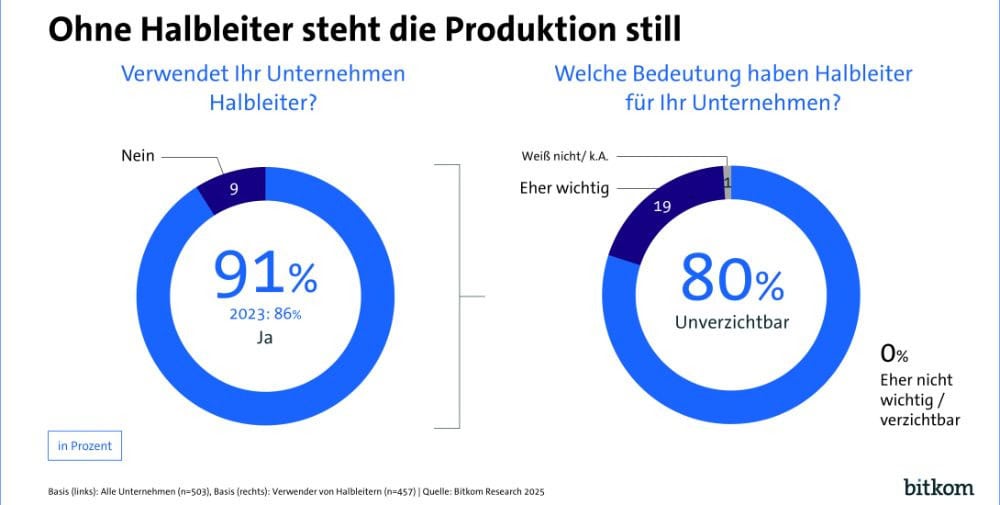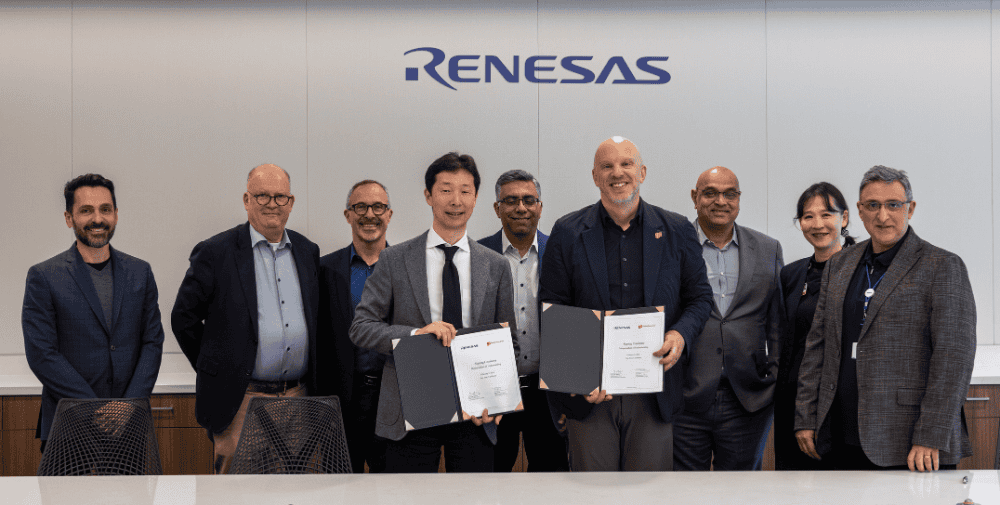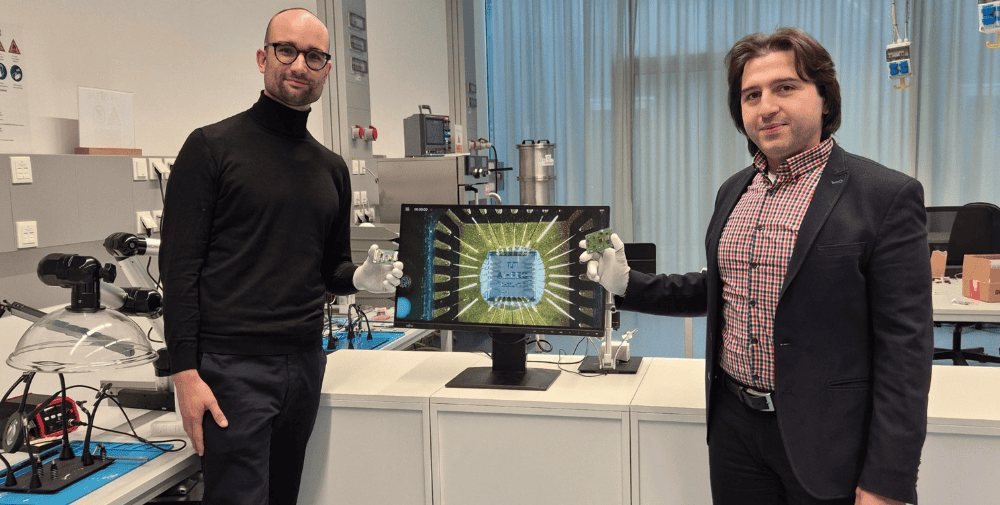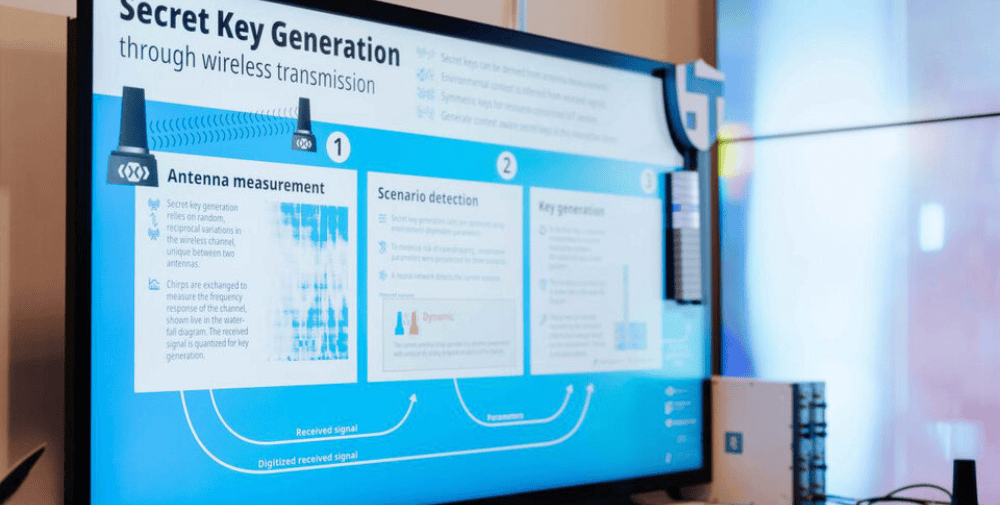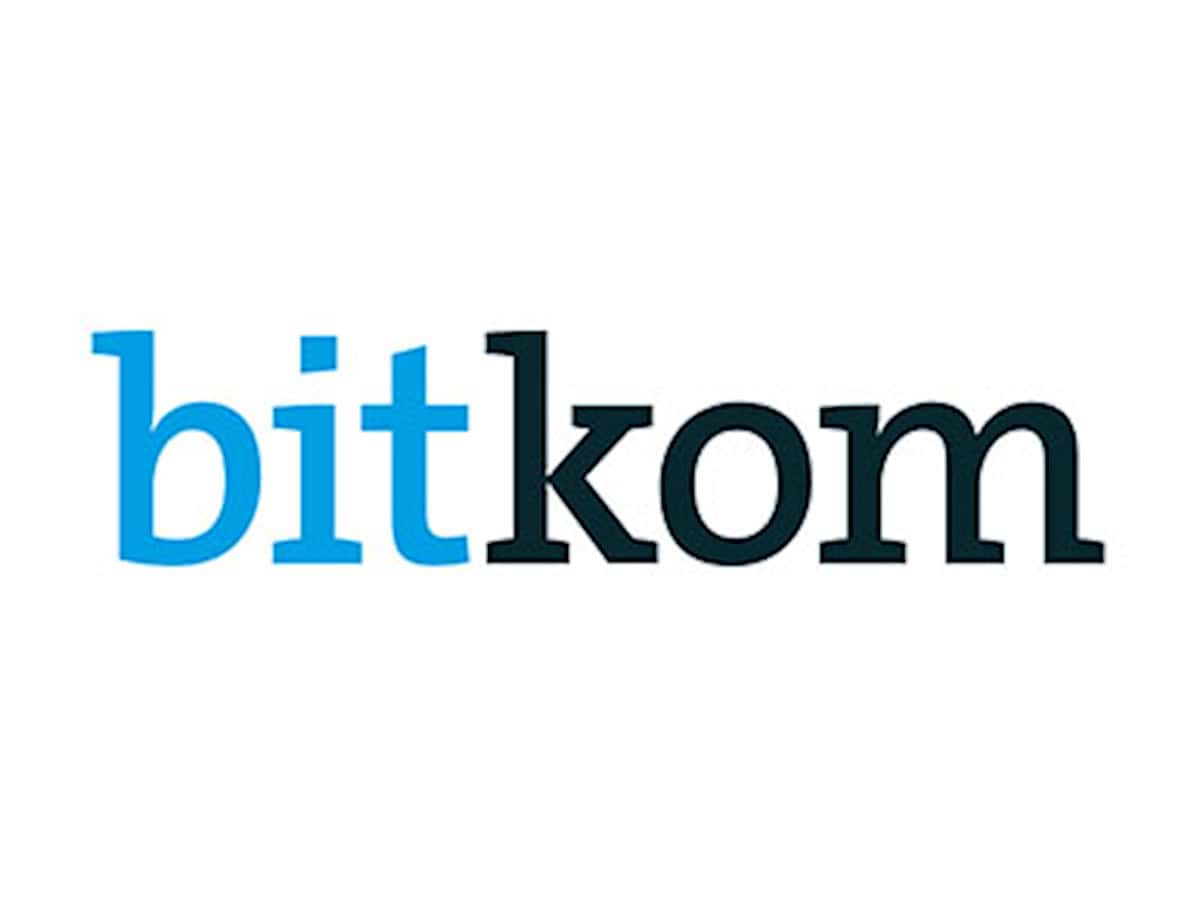
“Semiconductors are at the heart of international economic conflicts,” says Bitkom President Dr. Ralf Wintergerst. “We therefore need a strong ecosystem of semiconductor-related companies in Germany and Europe. This will enable us to reduce dependencies and make us less susceptible to blackmail.”
91% of the companies surveyed use semiconductors. For 80 percent of them, semiconductors are indispensable for their own business. Those who have already purchased semiconductors or will do so in 2025 will mainly purchase them from companies headquartered in the USA (72%) and China (63%). In third place are semiconductor companies headquartered in Germany (54%) and in fourth place in Japan (36%). 28% source their semiconductors from companies based in Taiwan, 27% from South Korean companies and 26% from the rest of the EU. “Semiconductors are used in smartphones, medical technology, cars, industrial plants, data centers and communication networks – without them, many areas of our lives would come to a standstill,” says Wintergerst. “Their production is based on a highly complex global production network in which many countries are closely intertwined.” Not only China and the USA, but also Taiwan plays a central role in the development and production of the most powerful chips. A conflict over Taiwan would therefore massively disrupt the global chip supply far beyond the region. 90% of the companies surveyed demanded that Germany put an end to one-sided dependencies in the supply of semiconductors. 86 percent consider a strong semiconductor ecosystem important for national security and 85 percent consider it crucial when it comes to Germany’s digital sovereignty. Companies continue to experience the status quo of semiconductor supply as difficult, albeit less problematic than in 2023 and 2021. 60% of those who have already purchased semiconductors this year had difficulties with procurement – 89% said this in 2023 and 81% in 2021.
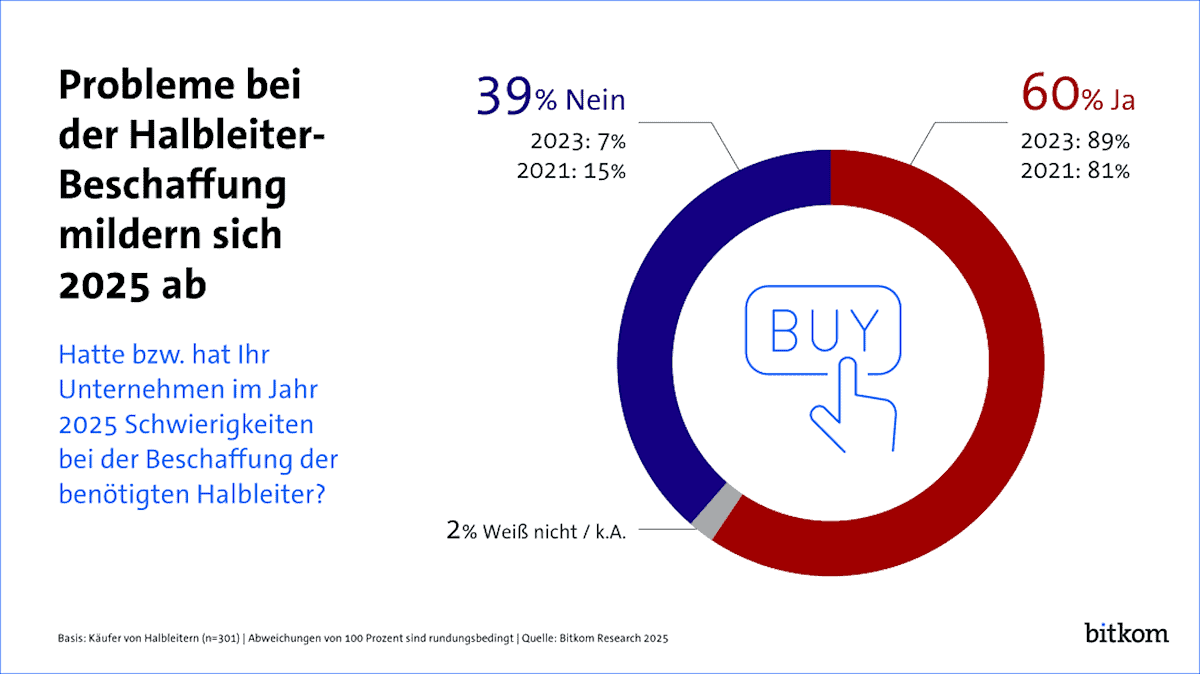
Delays in delivery of 4 months on average
However, the difficulties remain manifold: 96 percent of companies affected by procurement problems suffer from delays in delivery, 91 percent are confronted with price increases. For 84 percent, certain components are partially unavailable, while 75 percent have seen their delivery quantities reduced. Two thirds (67%) are struggling with export or import restrictions. The average delivery delay for semiconductors in Germany is currently around 4 months. This means that the delay has eased slightly, but remains at a high level: two years ago it was 5 months, in 2021 it was still 6.5 months. Wintergerst: “The situation on the semiconductor market remains tense – even if the worst bottlenecks of recent years have eased. Delivery delays, price jumps and export restrictions remain a brake on the German industry. In order to become more independent in the long term, more European production capacities, strategic partnerships and targeted measures that focus on the entire value chain are needed. The fact that the German government wants to tackle this problem with its own microelectronics strategy is therefore an important step.”
64% use special semiconductors for AI
Semiconductors are also indispensable for the use of artificial intelligence in this context. Two thirds (64 percent) of companies that use semiconductors already have special chips for AI in use – 49 percent for running AI applications, for example in devices, machines or servers – and 24 percent for developing or training their own AI models, including 9 percent that use both types of application. “Artificial intelligence requires particularly powerful semiconductors – conventional chips are often not enough. Specialized processors such as GPUs or AI chips enable the training and execution of complex models and are therefore crucial for powerful AI applications,” emphasizes Wintergerst.
When selecting semiconductor suppliers, the location of the manufacturer plays a comparatively minor role – much more important are factors of cost-effectiveness and, above all, IT security: three quarters (75 percent) name hardware security as an “extremely important” criterion – i.e. that there are no hidden vulnerabilities or backdoors built into the chips that could give third parties access. 73% describe reliable delivery as “extremely important” and 60% the reputation of the manufacturer. The energy efficiency of semiconductors is ranked similarly highly, with 60% also rating it as “extremely important”. In contrast, only 37% consider the lowest possible price to be extremely important, while only 27% consider the manufacturer’s headquarters to be extremely important.
How to deal with suppliers from the USA is nevertheless an issue for many companies that buy or want to buy semiconductors there (81%) and is characterized by uncertainties due to US trade policy, among other things. 15 percent already state that they no longer want to purchase semiconductors from the USA in future – 13 percent definitely, 2 percent probably. A further 21% would like to source semiconductors elsewhere, but have not found any equivalent alternatives. 14 percent want to continue buying from American companies, even though there are equivalent alternatives for them – and 31 percent will probably purchase semiconductors from companies based in the USA.
42 percent expect the supply situation to be critical in 2026
The uncertainty and therefore also the indecision of companies that use semiconductors is high when it comes to the outlook for the coming year. 42% expect the supply situation in 2026 to be either very critical (5%) or somewhat critical (37%). 55 percent expect the supply situation to be fairly good (53 percent) or very good (2 percent).
Many companies that use semiconductors have adapted to the ongoing chip shortage and taken strategic measures to mitigate it. More than half (56 percent) are stockpiling semiconductors or building up their own inventories. 52 percent have entered into long-term agreements with suppliers or vendors. 44 percent are looking for alternative suppliers, e.g. in other countries, and just as many (44 percent) have developed a multi-vendor strategy, i.e. buy their semiconductor components from several suppliers instead of just one. Many companies have also become active in the area of design and in building up their own expertise: More than one in five companies (22 percent) that use semiconductors have redesigned products and are using available semiconductors as an alternative. Almost as many (21 percent) are building up their own expertise or teams in chip design – and 21 percent are doing this for the manufacture of semiconductors. Research and development also play a role: 18 percent cooperate directly with semiconductor manufacturers or research institutions in research and development.
How politics can help
Many companies in the sectors surveyed are in favor of tax and subsidy policy incentives to ensure the supply of semiconductors in Germany in the future. 86 percent call for subsidies for domestic production, for example for the construction of semiconductor factories. Wintergerst: “The demand for tax and subsidy incentives for domestic semiconductor production is a signal from companies to politicians. Germany must hold its own in the international competition for subsidies. However, reliable framework conditions, well-trained skilled workers and an administration that accelerates rather than slows down investments are at least as crucial,” says Wintergerst.
80 percent of companies also want tax and subsidy policy incentives for customers to order from domestic manufacturers – and 72 percent for investments in chip design, production and packaging, for example. Strategic measures are also in demand: two thirds (69%) are in favor of promoting training and further education measures in the field of microelectronics. 69 percent are in favor of promoting greater transparency regarding the availability of semiconductors and semiconductor supply chains. The shortage of skilled workers is also a serious problem for Germany as a semiconductor location, which 66% of companies believe should be countered by targeted support for the immigration of qualified workers in the field of microelectronics. “Specialists in semiconductors and microelectronics can choose their jobs anywhere in the world,” emphasizes Wintergerst. “If we want them to come to Germany and strengthen Germany as a chip location, we not only need targeted recruitment campaigns and an open social climate, but also unbureaucratic, end-to-end digital administrative processes.”
Bitkom on the German government’s microelectronics strategy
In this context, Bitkom welcomes the microelectronics strategy planned by the German government. It focuses on a holistic approach from design to skilled workers through to production and thus strengthens Germany’s technological and economic expertise, according to the digital association. It is crucial that measures along the entire value chain are aligned with the needs of user industries and market potential, that design expertise is expanded and that synergies between companies, start-ups and associations are used in a targeted manner. With clear goals, measurable progress and close coordination with European initiatives, the strategy could significantly advance the development of energy-efficient, secure and high-performance chips. Wintergerst: “In order to strengthen our competitiveness and security of supply, we must consistently expand Germany as a semiconductor location – with our own production capacities, cutting-edge design expertise and attractive framework conditions for skilled workers from all over the world.”
Note on methodology
The data is based on a survey conducted by Bitkom Research on behalf of the digital association Bitkom. This involved a telephone survey of 503 companies from the manufacturing industry and ICT services with 20 or more employees in Germany, including 457 companies that use semiconductors. The survey took place in the period from week 30 to week 36 2025. The overall survey is representative.
– – – – – –
Further links
👉 www.bitkom.org
Graphic: Bitkom
